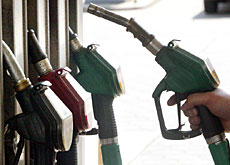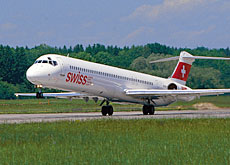Rising oil prices threaten to slow recovery

Experts are cautioning that rising oil prices could put the brakes on Switzerland’s nascent economic recovery.
The warning comes amid fears that a barrel of oil – currently trading at a 21-year high of $45 (SFr57) – could cost more than $50 by the end of the year.
United States crude oil prices reached a peak of $45.04 per barrel on Tuesday after unrest in Iraq halted production.
Some experts predict that if the price of oil stays above the $40 mark for an extended period of time, economic growth in Switzerland could fall from a predicted 1.9 per cent to 1.6 or 1.7 per cent.
But the chief economist at the State Secretariat for Economic Affairs (Seco), Aymo Brunetti, sees few indications that Switzerland’s economic recovery will be strangled by high oil prices.
“You cannot say that the global economy will not be affected… but the current situation cannot be compared with the oil crises of the 1970s and 1980s,” he said.
Looking abroad
Some analysts argue that high oil prices are unlikely to jeopardise economic growth and point to the compensating effect of the weak dollar – down to SFr1.25 – and Switzerland’s low dependence on oil as factors in the country’s favour.
Jeremy Baker, an energy analyst at Credit Suisse, argues that the weak dollar could even help the economy.
“In the long term, the weak dollar neutralises many effects of the increase in [oil] prices,” he told swissinfo.
But he added that the dollar rate might rise following Tuesday’s decision by the US Federal Reserve to push interest rates up by a quarter of a percentage point to 1.5 per cent.
Feeling the pinch
Analysts are warning that consumer spending could be affected if the price of a barrel of oil continues to rise.
“In general, the first reaction from consumers comes when the oil price increases to between $25 and $30,” said Baker.
“The second change in consumer attitudes comes when the prices rise to between $45 and $60,” he added.
Motorists in Switzerland are already feeling the pinch. The price of a litre of unleaded fuel has risen by 20 centimes to an average of SFr1.50 since the beginning of the year.
This means that 50 litres costs SFr10 more now than it did eight months ago.
Impact on business
Companies that use a lot of fuel are also feeling the effects of high oil prices.
Three months ago Switzerland’s national airline, Swiss, slapped a three per cent fuel surcharge on the price of tickets.
Swiss heating oil distributors have also been affected, with prices rising by ten centimes to 53 centimes per litre.
Daniel Sieber from Oel-Pool, which represents the country’s fuel distributors, said clients were not buying because they are waiting for prices to fall.
He added that there could be “great difficulties” in distribution if stocks run dry during the autumn and winter.
$50 a barrel?
According to analyst Emmanuel Gautrot at Bank Pictet in Geneva, oil prices could climb as high as $50. But he said that in the mid-term the price should fall to between $35 and $40.
Gautrot added that it was important to resolve uncertainty regarding oil production in Russia and Venezuela.
There are fears that Russian oil giant Yukos – which produces two per cent of global output – might have to suspend production amid an ongoing dispute with the Russian government.
Political unrest in Venezuela, the world’s fifth-largest oil producer, is also causing concern.
Tension in Iraq, meanwhile, continues to affect oil production. The country has the world’s second-largest oil reserves after Saudi Arabia.
swissinfo with agencies
The price of crude oil in the United States reached a peak of $45.04 per barrel on Tuesday.
Some experts fear that the price of a barrel of oil could top $50 by the end of the year.
The price of a litre of unleaded fuel in Switzerland has risen by 20 centimes to SFr1.50 since the start of the year.
At an average SFr1.47 per litre, unleaded petrol is divided as follows:
– 85 centimes for the taxman.
– 47 centimes for the refined product.
– 15 centimes for distribution (including 1-5 centimes for petrol stations).

In compliance with the JTI standards
More: SWI swissinfo.ch certified by the Journalism Trust Initiative










You can find an overview of ongoing debates with our journalists here . Please join us!
If you want to start a conversation about a topic raised in this article or want to report factual errors, email us at english@swissinfo.ch.